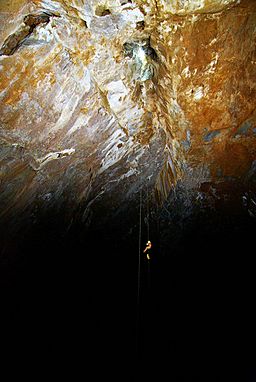Torca del Carlista facts for kids
The Torca del Carlista (which means Carlista Cavern in English) is a huge limestone cave in Cantabria, Spain. It's about 35 kilometers (22 miles) from the city of Bilbao. This amazing cave is known for its massive main chamber.
The entrance to the cave is quite small, only about 1 meter (3 feet) wide. It's located high up on the slopes of the Cantabrian Mountains. After entering, you go down a narrow passage that drops about 45 meters (148 feet) straight down. Then, it opens up into the cave's main area.
The main chamber is incredibly large. It's about 520 meters (1,706 feet) long and 245 meters (804 feet) wide. The total size of this chamber is more than 76,620 square meters (824,730 square feet), which is like 20 football fields! It's the fifth-largest underground chamber in the world. The ceiling of this chamber is very high, reaching up to 120 meters (394 feet) at its tallest point.
History of Torca del Carlista
The name Torca del Carlista probably comes from a nearby mountain called Carlista Peak. This mountain was named after a group in Spanish history called the Carlists.
The Carlists were people who supported a person named Don Carlos to become the king of Spain. They were against the Royalists, who supported a different king. Local stories say that a Carlist supporter once chose not to surrender to the Royalists near this cave.
Exploring the Cave
The first people to try and enter the cave were cavers from a group called Grupo Espeleológico Vizcaíno (GEV) in 1957. They were trying to explore its depths.
The cave was first successfully explored in 1958. A team of Spanish speleologists from Grupos Universitarios de Montaña (GUM) managed to go deep inside. Today, only very experienced cavers are allowed to enter Torca del Carlista because it can be dangerous.
Geology and Formations
The main part of the cave is called the GEV Grand Hall. This name honors the GEV cavers who first explored it. There are two other large areas in the cave, named Iradier and Aranzadi.
Scientists believe that a nearby cave, Pozalagua Cave, might have once been connected to Torca del Carlista. They think this because both caves have similar rock formations. Over time, fallen rocks likely separated them into two different caves.
See also

- In Spanish: Torca del Carlista para niños
 | Emma Amos |
 | Edward Mitchell Bannister |
 | Larry D. Alexander |
 | Ernie Barnes |


